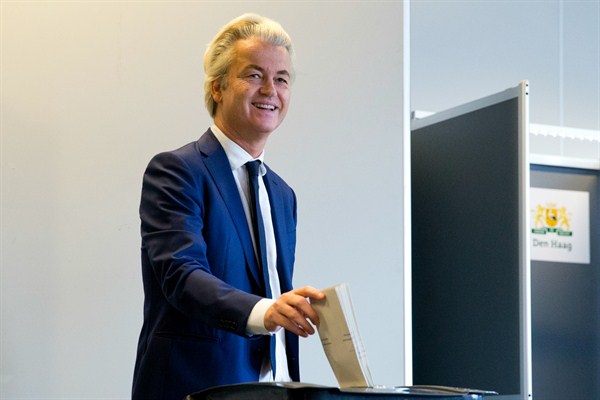European progressives are feeling cautiously optimistic. Last year, in the shadow of the United Kingdom’s shock referendum vote for Brexit and then the election of Donald Trump as president of the United States, many in Europe were fearful of a so-called contagion effect. With looming elections in the Netherlands and Austria, European leaders braced for their own populist backlash against liberalism, the European Union and international free trade. Inspired by Trump and against the backdrop of a pan-European refugee crisis, populist nationalists seemed poised to reimpose themselves onto the political agenda. Once again, a major crisis loomed on the horizon for a continent still in only a fragile recovery from the Great Recession.
Yet the crisis never came. In the Netherlands, predictions that Geert Wilders, a populist anti-Islam challenger, could become prime minister proved wide of the mark. In general elections in March, Wilders finished a distant second with 13 percent of the vote and 20 seats in parliament. Two months later in France, Marine Le Pen, the leader of the anti-EU National Front party, failed in her quest to win the presidential election. Instead, beleaguered French voters handed the presidency to the moderate centrist Emmanuel Macron, whose newly formed party La Republique En Marche—or the Republic on the Move—went on to secure a commanding majority in subsequent legislative elections in June. Just before the French parliamentary polls, in snap general elections in the United Kingdom, the anti-immigration and anti-EU U.K. Independence Party, or UKIP, saw its share of the vote slump from the 13 percent it had polled in 2015 to less than 2 percent only two years later.
While the populist right had spent much of the past year predicting that 2017 would give rise to a “patriotic spring,” they were instead forced to explain a series of disappointing performances at the polls. Against this backdrop, and with a new sense of cautious optimism about the eurozone economic area, progressives in Europe began to talk of the collapse of populism and a resurgence of support for the moderate center. But to what extent, if at all, is the populist right in retreat?

